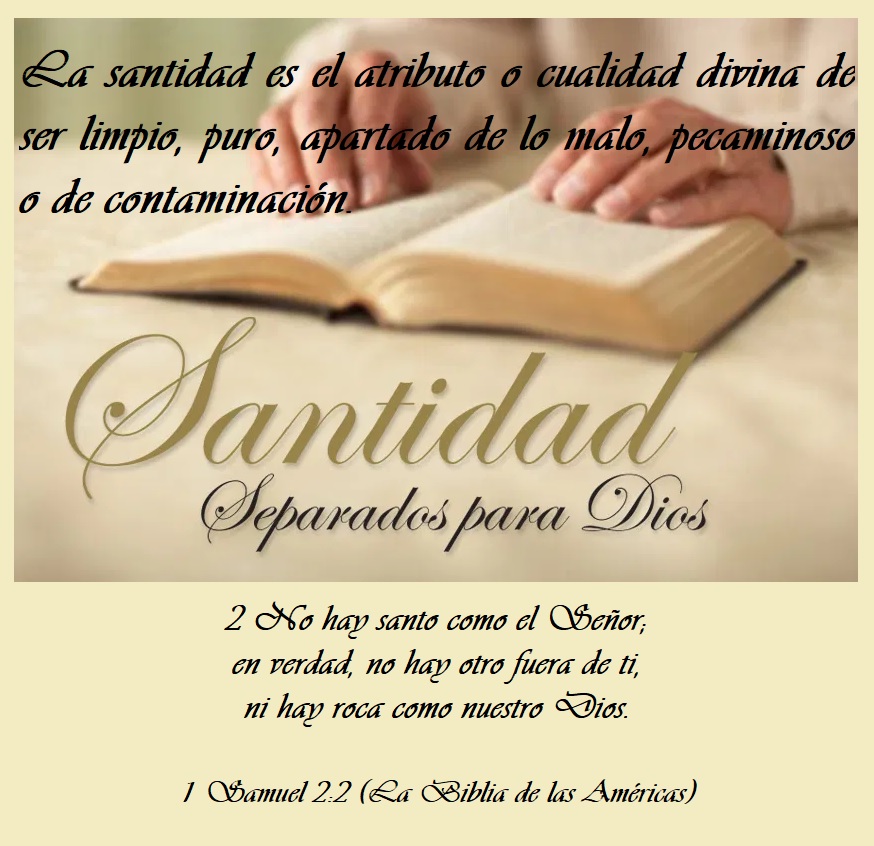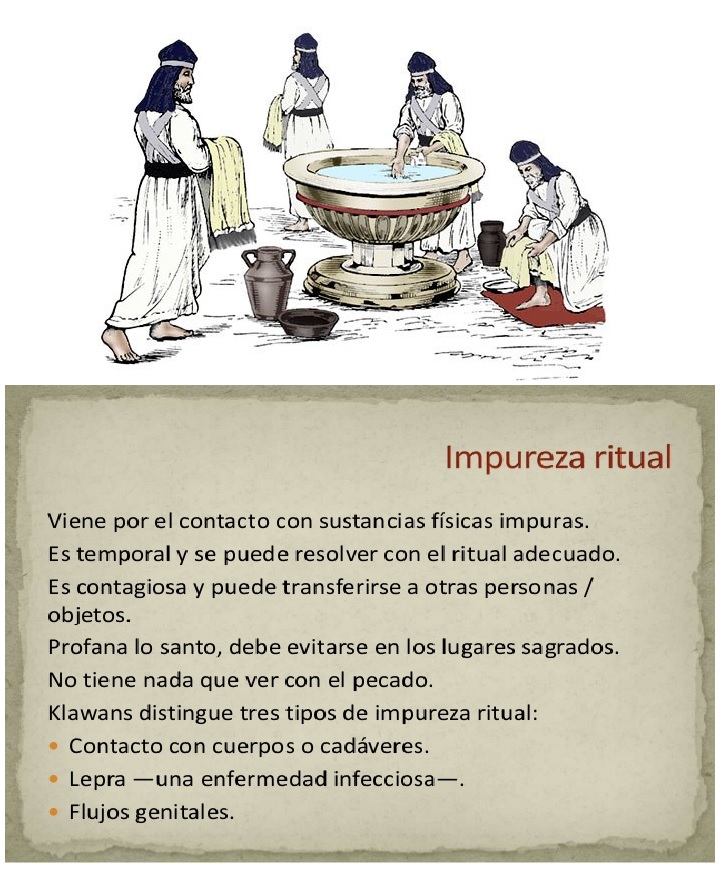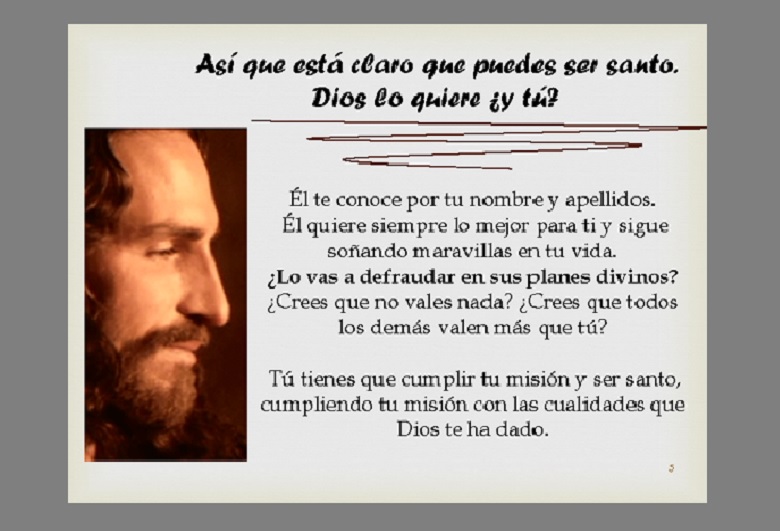What is holiness?: For many, this term is only related to people who are morally good, more in the biblical sense it represents a way of life. Because this is the main fruit that must be manifested in a life transformed by Christ Jesus.

What is holiness?
A basic principle in the Christian life is that without holiness no one will be able to see the Lord Jesus Christ, manifested in every Christian who carries the word of the gospel. Therefore, holiness is the first fruit that must be produced in a Christian and child of God, in order to be a true witness of Christ before other people.
How can a Christian live in holiness? Jesus Christ in his love and infinite mercy has given the concrete instruction to this, and it is to live a life in obedience to the word of God. At this point it is necessary for us to stop and reflect, are we complying with this instruction? Are we obeying God's commands?
Jesus, during his ministry on earth left us a very clear message, and that is that we were chosen by him to bear fruit, as it is written in:
John 15:16 (RVC): -You did not choose me. Rather, I have chosen you, and have appointed you to go and bear fruit, and your fruit remain; so that everything you ask the Father in my name, he will grant it.
Furthermore, within God's people, leading a holy life is not just for a select few. Living in holiness is an obligation according to the will of God by which we were called, to be his children:
1 Thessalonians 4:3 (KJV-2015): For this is the will of God, your sanctification: that you turn away from sexual immorality;
As Christians, we have been called and chosen by God for the primary purpose of manifesting his Son, Jesus Christ. So we must be imitators and followers of Christ, for the glory of God:
John 15:8 (RVC): In this my Father is glorified: in that they bear much fruit, and so be my disciples.
Biblical meaning of the word holiness
The word holiness found in the Bible is related to the word saints, which comes from the Hebrew word qadoš, later translated into the Greek hagios and then into the Latin sanctus. The Hebrew root denotes the meaning of chosen, differentiated, distinguished, separated or set apart by God and for God.
Therefore, the word holiness has the meaning relative to its root as a nature, characteristic or quality of saint. The word holiness defines people who live away or away from everything that is not pleasing in the eyes of God.
God being the representation of supreme holiness, in the same way his Son Jesus Christ who is pure, without stain, perfection in every way. And the imperfect saints of him seeking, following the perfect one, who is Jesus Christ.
Likewise when we speak of holiness, God ordered each of his saints and faithful followers of Jesus Christ to fulfill the commandment of evangelism. But do you know what this commandment is about? We invite you to enter here, Evangelismo: What is it? How to develop it? And more.
The Lord has given each of his saints the task of proclaiming, witnessing and spreading the message of salvation. However, it is important to note that not every faithful follower of Christ has the gift of evangelizing, even though absolutely all believers have the order to share the word of the Lord.
What is to be holy in the Bible?
Although, as human beings we are imperfect, God in his call considers us holy. The body as such is corruptible, but we are the temple and abode of the living God, let us remember what is written in:
1 Corinthians 3:16 (ESV): Do you not know that you are the temple of God, and that the Spirit of God lives in you?
2 Corinthians 6:16b (NKJV): You are the temple of the living God! God has already said: "I will dwell and walk among them, and I will be their God and they will be my people."
Therefore, it is only through Jesus Christ, through the Holy Spirit of God, that we can live sanctification. To do this we must obey God's commandments, do what pleases him, diligently fulfilling in spirit, God's will in deed and word.
As Christians and children of God we are called to stay away from all moral corruption. Without this representing a burden but rather a joy in being able to be one of God's chosen saints and obedient to his word.
1 Peter 1:15-16 (NKJV): 15 On the contrary, live a completely holy life, for holy is he who has called you. 16 It is written: "Be holy, because I am holy."
The apostle Paul in this last verse reminds us of God's words to his people, written in Leviticus 11:44. In it our Lord does not exhort us not to contaminate ourselves in order to maintain ourselves in holiness.
In addition to keeping ourselves in holiness when preaching the gospel, the word of God, we must do it boldly, that is, with authority and conviction. Well, it is certainly impossible to preach with authority when you do not have conviction.
But do you know what it is? boldness?, Here we will tell you Boldness: What is it? Meaning? How to get it? We invite you to enter and you can know everything about him.
What is the holiness of God?
The holiness of God is morality, ethics in its purest form, this attribute of God makes him supremely perfect, supremely Holy. This is because God is the almighty, possessing the power to create the entire universe and sustain it.
A tangible way to imagine what the holiness of God is, is by observing what the sun represents in the universe. The sun gives off enough energy to give life to the planet earth, an attribute of great power.
In the entire solar system there is no other star equal to the sun, therefore, in addition to being powerful, it is unique. So far we can see that the sun is beneficial, but it can become dangerous if a spacecraft seeks to approach it.
Because the closer you are to the sun, its energy or heat becomes stronger or more intense, to the point of being able to consume that spacecraft. This same inconsistency happens with the holiness of God, but in this case it is because of the perfection of his purity, of his holiness.
In the old testament of the Bible this inconsistency of the effect of the holiness of God towards the impurity of man can be observed. As for example when Moses is for the first time in the presence of God, in the form of a burning bush.
Exodus 3:5-6: 5 And he said: Stay away; remove your shoes from your feet, because the place in which you are, holy land is. 6 And he said: I am the God of your father, the God of Abraham, the God of Isaac, and the God of Jacob. So Moses covered his face, because he was afraid to look at God.
Moses covered his face because of the intensity of God's holiness, because he with his impurity stood before the holy presence of God.
The impure prevents seeing the holiness of God
In the previous biblical text, Moses' impureness prevented him from seeing God's holiness face to face and that is why God tells him: – Don't come any closer!
In the same way, the respect and danger represented by the intensity of God's holiness can be observed when the tabernacle was established in the midst of the people of Israel, as well as in the temple built in Jerusalem.
The tabernacle in the old testament of the Bible was the place where the presence of God was symbolized by the ark of the covenant and through it he guided the people of Israel. If you want to know more about this topic, we invite you to enter here Tabernacle: What is it?, meaning, and much more.
When the temple was built in the city of Jerusalem, one of its rooms was called the holy of holies. Because this room marked the entrance to the presence of God.
Only men authorized by God could be in that room and they had to previously fulfill some rites demanded by the Lord for their purification. In the same way, all the objects inside the temple had to go through the rite of purification.
In this way there was no risk of being in danger in the presence of God's holiness. What could be translated today as being morally pure, to understand it in a simpler way. However, this purity goes beyond being morally pure, and there is a lot of talk in the Bible in the Old Testament about what was considered to be ritually clean.
purification rites
In Old Testament times purification rites established the separation between someone and anything related to death. Like, for example: touching something sick or dead, being in contact with bodily fluids considered impure, etc.
Being impure was not then necessarily related to being sinful or sinful. To be ritually impure was to go into the presence of God in a condition of impurity, without previously washing away all contact with death.
That is why God gives the precise instructions on how the ablution or purification washing should be done in order to access the temple. This theme is developed in the book of Leviticus in the Bible.
The Holiness of God and the prophet Isaiah
In the Old Testament, specifically in the biblical text of Isaiah 6:1-10, you can read an interesting and strange vision that this prophet of God has. In the vision the prophet sees that he is inside the temple and in the presence of God's holiness.
Isaiah experiences intense fear, because he knows of his condition or state of impurity and fears being struck down by the holiness of God.
Isaiah 6:5-7 (RVR 1960): 5 Then I said: Woe to me! that I am dead; for being a man of unclean lips, and dwelling in the midst of a people whose lips are unclean, my eyes have seen the King, the Lord of hosts. 6 And one of the seraphim flew to me, having in his hand a burning coal, taken from the altar with tongs; 7 and touching with it on my mouth, he said: Behold, this touched your lips, and your guilt is taken away, and your sin is cleansed.
The prophet knew the consequences of being there in the presence of God and is afraid of being destroyed. But an angel of the Lord with a burning coal seals his lips and says: Your iniquity has been removed and your sin forgiven. In this vision of Isaiah a new purification rite can be seen.
A very pure and holy coal seals the lips of the prophet, transmitting its purity to Isaiah. So the holiness of God does not annihilate him, but he is transformed by it.
The Holiness of God and the prophet Ezekiel
Later in the book of Ezekiel, specifically in the passage of chapter 47, verses 1 to 12, you can read about another interesting and no less strange vision that this other prophet of God has.
Ezekiel in his vision can see how water comes out of the temple towards the sea, until it becomes a river. A river whose deep waters flow through the desert, removing all dryness and filling it with greenery.
In this vision of Ezekiel another form of purification rite can be seen, this time the holiness of God comes out of the temple in the form of water. Leaving behind a trail of green trees until its waters flow into the Dead Sea.
God's holiness in this prophetic vision gives life to everything he touches, makes everything fresh. So, instead of performing a purification rite in order to enter the presence of God, here the holiness of the Lord comes out of the temple and purifies all things, giving them life.
Ezekiel 47:8-9 (KJV 1960): 8 And he said to me: These waters go out to the region of the east, and will descend to the Arabah, and will enter the sea; and entrances into the sea, the waters will receive healing. 9 And every living soul that swims wherever these two rivers enter shall live; and there will be many fish for having entered these waters there, and they will receive healing; and everything that enters this river will live.
Ezekiel 47: 12 (RVR 1960): And next to the river, on the shore, on both sides, all kinds of fruit trees will grow; its leaves will never fall, nor will its fruit fail. In due time it will mature, because its waters come out of the sanctuary; and its fruit shall be for food, and its leaf for medicine.
Jesus and the Holiness of God
The mystery of the two previous prophetic visions is revealed until we come to know Jesus. In the gospels it can be verified that Jesus is the fulfillment of what was announced by the ancient prophets.
Surprisingly, Jesus performed wonders, He moved from one place to another healing people, removing impure things from them. As for example the healing of the ten lepers, leprosy was a state of impurity, or the woman who heals from the flow of blood, also considered impure.
In the same way, Jesus performs the miracle of reviving people who are already dead, as is the case with Lazarus. In all these cases, the state of impurity of the people does not contaminate Jesus, on the contrary, Jesus transmits his purity to them and heals them. Jesus is then the holiness of God incarnate, he is the burning coal of Isaiah's vision and he is also the water of life of Ezekiel's vision.
Jesus is the holiness of God, he together with his followers are now the temple of God. In this way the sanctification of God goes out into the world bringing life, healing and hope.
John 17: 15-20 (RVR 1960): 15 I do not ask that you take them out of the world, but that you keep them from evil. 16 They are not of the world, just as I am not of the world. 17 Sanctify them in your truth; Your word is truth. 18 As you sent me into the world, so I have sent them into the world. 19 And for them I sanctify myself, so that they too may be sanctified in truth. 20 But I pray not only for these, but also for those who will believe in me through their word.
What is holiness and how can a Christian live in it?
We Christians are the pipe or channel that carries the living water that is Jesus Christ, he represents the rivers of living water that flowed from the temple in Ezekiel's vision. To live in holiness we must live and transmit the truth that is the word of God, this leads us to another vision of the holiness of God found in the book of revelations in the Bible.
Revelation 21: 1 (KJV 1960): New heaven and new earth, 21 I saw a new heaven and a new earth; because the first heaven and the first earth passed away, and the sea was no more.









